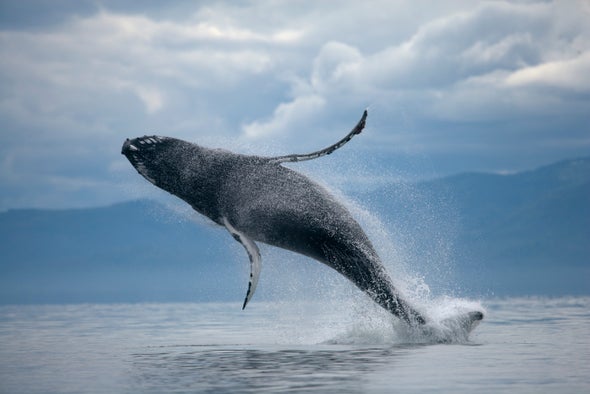(单词翻译:单击)
听力文本
This is Scientific American's 60-second Science, I'm Christopher Intagliata.
In 1964 the Beatles set foot in America and kicked off the British invasion. But musical revolutions don't occur only in human culture. They also happen among humpback whales and their songs.
"Yeah it's very much like a fashion or a new type of song that comes from a different country, and all of a sudden, it's number one, and everyone wants to listen to it."
Clare Owen, a marine scientist at the University of St. Andrews. The number one songs she's talking about are the tunes sung by humpback whales in the South Pacific, which Owen's team recorded at half a dozen wintering grounds.
Among the recordings, they found several variations on an older theme throughout the region.
(CLIP: Song 1)
But they also found a new, more commonly recorded song.
(CLIP: Song 2)

Even though that song was new, it had spread rapidly through multiple whale populations, replacing the old tune. In other words: it was a hit. And the key to that rapid spread, Owen says, might be a newly studied hub of cetacean musical exchange: the uninhabited Kermadec Islands, north of New Zealand, where whales from all over the South Pacific converge en route to Antarctica.
And the search for songs—and their information—may be a reason for the convergence.
"We have whales traveling from the Cook Islands and making a huge deviation to the Kermadec on their southerly migration. And so it's, yes, certainly opens up that question of: Why is this so important? And what does this learning of the song mean to their survival and maybe their reproduction?"
Maps, details and links to the full songs are in the journal Royal Society Open Science.
Owen's team did catch one whale who was singing a mash-up of the older song and the newer "hit" song—evidence, perhaps, of it being caught in the act of revising its repertoire—and of the new tune rising to the top of the humpback charts.
Thanks for listening for Scientific American — 60-Second Science. I'm Christopher Intagliata.
参考译文
这里是科学美国人——60秒科学系列,我是克里斯托弗·因塔格里塔。
1964年,披头士乐队踏足美国乐坛,开启英国入侵。但音乐革命并不仅仅发生在人类文化中。它们也发生在座头鲸及其歌声中。
“是的,这很像来自不同国家的时尚或新类型歌曲,突然间登上榜首,每个人都想听。”
圣安德鲁斯大学的海洋科学家克莱尔·欧文说到。她谈到的榜首歌曲是南太平洋座头鲸唱的曲调,由欧文的团队在六个越冬地录制。
在这些录音中,他们发现了整个地区都存在的旧主旋律的多个变奏曲。
(片段:歌声1)
但他们也发现了新的、更为常见的歌声。
(片段:歌声2)
尽管这是首新歌,但它已经迅速在多个鲸群中传播,并取代了旧曲调。换句话说:这是首热门歌曲。欧文表示,迅速传播的关键,可能是人们最近研究的一个鲸类音乐交流中心:新西兰以北无人居住的克马德克群岛,南太平洋各地的鲸鱼在前往南极的途中都会聚集在那里。
搜索歌曲和信息可能是鲸鱼聚集在那里的原因。
“有些鲸鱼从库克群岛出发,在向南迁徙的途中严重偏离,抵达克马德克群岛。这无疑引出了一个问题:为什么这首歌如此重要?学习这首歌对它们的生存和繁殖意味着什么?”
地图、具体信息和完整歌曲的链接都刊登在《英国皇家学会学报·开放科学》期刊上。
欧文的团队确实捉到了一只混唱旧歌和新热门歌曲的鲸鱼,这或许表明它在调整自已曲库,也可能是这首新歌登上了座头鲸歌曲排行榜榜首。
谢谢大家收听科学美国人——60秒科学。我是克里斯托弗·因塔利亚塔。
译文为可可英语翻译,未经授权请勿转载!
重点讲解
重点讲解:
1. set foot in 踏上,涉足(某地);
A little later I left that place and never set foot in Texas again.
之后没多久我离开了那个地方,从此再也没有回过得克萨斯。
2. kick off (事件、比赛或讨论等)开始;
The festival kicks off on Monday, September 13.
节期从9月13日星期一开始。
3. all of a sudden 突然地;出乎意料地;
All of a sudden she seemed to want to make peace and patch up our quarrel.
突然她似乎想要和好,结束我们之间的争吵。
4. en route to 在途中,沿途;
They have arrived in London en route to the United States.
他们已经到达伦敦,正在前往美国的途中。


